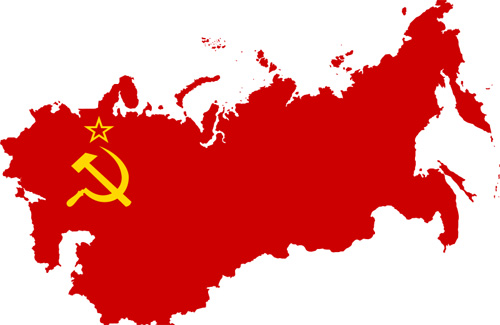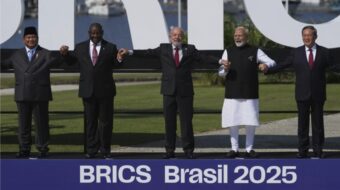
It isn’t something that a lot of people lose sleep about, and that includes me. But it bothers me when I see someone assert that the retreat of the working class, social democratic, communist, and people’s movement in recent decades began with the implosion of the Soviet Union. Perhaps at first glance this seems reasonable, but with a bit of reflection it quickly becomes an untenable claim. It strikes me as an ideological construction to fit someone’s political disposition rather than serious analysis.
The reconfiguring of global power to the advantage of the imperialist states and transnational corporations and the retreat of the above-mentioned movements that followed was well on its way by the time things went south in the socialist world in the late 1980s. Even a quick glance at the facts locates the beginnings of this offensive in the mid 1970s. That’s more than a decade before the Soviet Union went belly up.
At that time, the unprecedented expansion of capitalism following World War II had largely exhausted itself, corporate profitability levels were sinking (especially in goods-producing sectors), inflation was raging, inter-corporate and inter-imperialist competition and rivalry were intensifying, the entry of low-cost producers, especially China and India, into the world market was in its early stages but its growth curve was up and out, the special status of the U.S. dollar in the global economy was being contested, and internationalization and financialization were becoming the new frame and engine of economic activity for big and small countries alike.
Faced with this confluence of events and processes, shifting terrains of struggle, and the imperative to reboot and reconfigure their economies, the ruling circles, especially in the U.S., decided (but not in a single room nor by way of a single decision) to reclaim political initiative and reassert their power. To wit: they went on a broad-scale offensive against their working class, democratic, anti-imperialist, and socialist adversaries. (See Jacob Hacker and Paul Pierson, Winner-Take-All Politics: How Washington Made the Rich Richer and Turned Its Back on the Middle Class; David Harvey, A Brief History of Neoliberalism; and Paul Sweezy and Harry Magdoff, Stagnation and the Financial Explosion.)
What began in the mid-1970s, however, took on a new life with the election of Ronald Reagan in 1980 and his reelection four years later. Reagan and gang gave this offensive new intensity and scope. The long-term process of massive wealth redistribution to the 1 percent, the scorched earth destruction of factories and union jobs, and a second arms race went into hyper-speed under his watch – not to mention that Reagan and his acolytes greased the skids for globalization and the rise of finance and financial speculation to the point where it became the main generator of profits and the driver of the larger economy.
The Reaganites also savaged democratic rights and changed the political discourse. Racism in the “raw” and cries of “reverse racism;” misogyny, homophobia, nativism, and militarist nationalism – these became their mantra. The notion that problems are individual in their making and solution, not socially constituted and collectively solved, was another one of their themes.
Social and political movements – labor included – retreated under the weight of this unrelenting right-wing offensive as well. Their influence and power were weakened if not greatly diminished; some didn’t survive the onslaught. More than a few at the time and later (for example Tony Blair’s and Bill Clinton’s Third Way in the 1990s) went beyond making necessary strategic and tactical adjustments to this new reality: they executed a total political and ideological makeover, seeking a viable niche in the new political environment in which the balance of forces had shifted decisively to the right.
Thus, the offensive of ruling circles had gathered plenty of steam and caused a lot of wreckage long before things began to unravel in Moscow under the weight of a combination of interacting external pressures, long-standing internal/structural contradictions, and social conflict (almost exclusively within the top layers of the Soviet state and Soviet Communist Party).
At the same time, it is incontestable that in the wake of the sudden dissolution of the USSR the offensive of U.S. imperialism gained new momentum, extended its reach, and raised its sights.
Indeed, it took less than a “New York minute” for the occupants of the White House during this period – Bush I and then Clinton – to realize that into their hands had dropped, completely unexpectedly, an utterly unique opportunity to liquidate the main representative and power base of the socialist community as well as claim the superiority – final victory – of capitalism and reshape the global order.
They didn’t disappoint. The boundaries of NATO almost immediately were extended into Eastern Europe, despite agreements not to do so. Governments friendly to deregulated markets, privatization, and foreign investment – and of course to the U.S government – were elected with the interference, advice, and generous support of the U.S. government. No opportunity was lost by government spokespeople to remind the world that the socialist, social democratic and communist movements and their ideas proved themselves to be bankrupt. The squeeze on countries of the Global South, no longer able to take advantage of the counterbalancing power and assistance of the Soviet Union, tightened. Finally, the projection of U.S. power by successive administrations to punish and replace unfriendly regimes for the purpose of securing global dominance in the 21st century became the favored policy option of Washington. That it would turn into an unmitigated disaster became apparent when the U.S. invaded Iraq and an expected triumphant victory morphed into a textbook example of the law of unintended consequences, while revealing the narrow limits of American power to any reasonable observer.
Or, to put it differently, while the meltdown of the Soviet Union didn’t trigger capital’s worldwide offensive, it did constitute a sea change in the balance of power and changed the dynamics of struggle – not to mention constituted a world historic defeat of Soviet socialism, especially for the communist movement that had invested so much of its moral, political, and intellectual capital in that particular socialist model. It stoked especially U.S. capitalism’s ambitions and aggressiveness, widen the scope of its attack, and give its offensive a far bloodier and destructive dimension. While every negative and violent turn in the global theater, including the Iraq War and its unintended consequences, can’t be fully explained by the meltdown/destruction of Soviet socialism, there is little doubt that U.S. imperialism without a counterweight to moderate its tendency to maim, injure, kill, and dominate showed little restraint in deploying its overweening power in the post-Soviet world.
If it seems like I’m splitting hairs here, I make no apologies. I have been around long enough to understand that the main task of the left is to capture the actual movement of the historical process if we have any hope of assisting a larger popular and diverse people’s coalition in their efforts to ease the burden of the present as well as facilitate a “new burst of freedom” in the not too distant future. Neither wishful thinking, abstract ideological constructions, or simple cause and effect schemes will help in this regard.
This article originally appeared at Sam Webb’s blog, samwebb.org.
Photo: Wikimedia Commons










